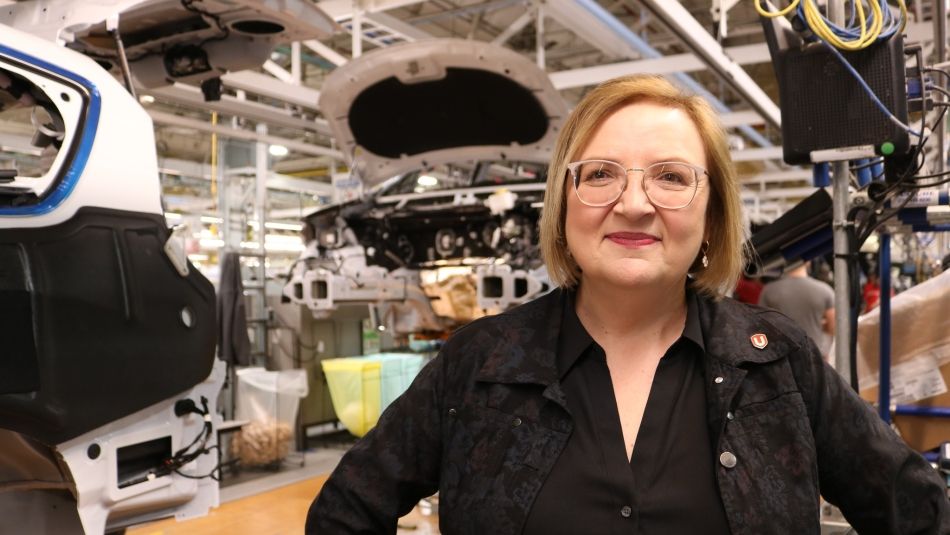
Share
Lana Payne - Op-ed contributor
Originally published in the Detroit Free Press July 24, 2025
Canada and the U.S. have, for half a century, built cars and prosperity together. During that time, auto unions on both sides of the border have fought for better working conditions and fair-trade agreements that raise living standards for workers.
Our automotive industries are deeply connected; our workers share the same struggles. Yet today, that relationship is under threat from a wave of U.S. tariffs that are hurting Canadian workers. Indeed, the tariffs hurt American workers too, including U.S. auto workers.
Canadian and American autoworkers are not each other’s enemies. Free trade agreements, along with other failed economic policies, have contributed to major job losses in both countries. In the last decade alone, and according to Unifor analysis of Ward’s Automotive industry data, Canada has seen its share of North American vehicle production fall from 13% to just 9%. The U.S. has also seen a decline from 68% to 66%, but Canada is being hit harder and faster by comparison.
If automakers sell vehicles in North America, they should build them here too. Canada buys about two million vehicles per year but built far less than that in 2024. That is not good enough. “Build where you sell” is more than a slogan — it’s a principle.
Last year, 5 million vehicles were sold in North America that weren’t made on this continent, and most of them landed in U.S. dealer lots. That’s the equivalent of 20 auto assembly plants worth of work. This is the real problem. Addressing that problem together is also how we can grow the manufacturing footprint in both our countries.
But instead of focusing on the root of the problem, current U.S. trade policy is increasingly targeting its closest ally, causing layoffs, and creating uncertainty for workers on both sides of the border.
Integrated supply chains, shared harm
The U.S. and Canada share an exceptional trading relationship in the auto sector, that is unlike any other in the world. Our two-way auto trade is virtually balanced — Canada sells $72 billion CAD in vehicles and parts to the U.S. and buys $77 billion back. We both have strong unions and high wages, won through decades of collective bargaining. We’ve stood shoulder to shoulder with the U.S. in defending our markets from a flood of Chinese EV imports.
And yet, Canada has been hit with multiple rounds of tariffs: 25% on non-U.S. content in vehicles, another 25% tied to fentanyl and border compliance rules and an initial 25% on steel and aluminum, now rising to 50%. These penalties are being imposed despite our tightly integrated supply chains and aligned economic interests.
The impact is real. Amid tariff threats, Stellantis paused the retooling of Brampton Assembly Plant in Ontario, likely delaying the next-generation Jeep Compass that would then create further delays at U.S. supplier facilities.
Within hours of President Donald Trump’s April 3 announcement of auto tariffs, Stellantis idled Windsor Assembly Plant — a facility that’s built minivans for U.S. and Canadian families since 1983 using U.S.-made engines and mostly American-sourced parts. Workers were laid off, at least temporarily, on both sides of the border.
This is the real cost of weaponizing tariffs against an ally whose fortunes are fundamentally tied to your own. Our histories are too intertwined to separate without consequences.
Trade agreements should lift up all workers
This history should not be dismissed, and no one should falsely claim that Canada has stolen American auto jobs. Canada has been building cars since 1904 — long before the U.S. was our major trading partner. By the 1920s, Canada was the world’s second-largest auto producer. It was the U.S.-Canada Auto Pact of the 1960s that created the most integrated auto industries in the world. Now, as history is being rewritten to justify U.S. tariffs, we must remind each other of how we got here and what we stand to lose.
The path forward isn’t to attack Canada. It’s to reform our trade policies together. The U.S.-Mexico-Canada Agreement (USMCA) needs to do better for workers — on all sides.
A new trade deal should incentivize local production and raise labor standards across North America. That includes protecting union rights in Mexico — but also in some U.S. states where unions are actively undermined.
USMCA made some important inroads, but more must be done to ensure trade agreements actually lift up all workers.
Stronger continental trade should drive global automakers to bolster North America as a world leader in vehicle innovation. That’s how we compete with China, where EV giant BYD now leads the world. If we let divisive trade tactics weaken our own industries or slow EV adoption, we’ll only fall further behind.
There is no time to waste. Working people in Canada and in the U.S. need a swift resolution and a long-term plan to strengthen the industry we share. The alternative is damage that could take a generation to undo, and that will harm the economic security of workers and their families
Blaming Canada won’t fix the problem — because Canada isn’t it.
Lana Payne is the national president of Unifor, Canada's largest private sector union. She is also a member of the Prime Minister’s Council on Canada-U.S. Relations.


